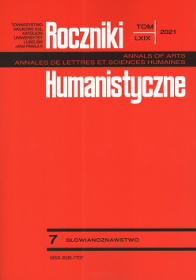Motywy i motywacje duchowe w Mistrzu i Małgorzacie Michaiła Bułhakowa w polskich źródłach periodycznych i zwartych po roku 1989
Spiritual Motives and Motivations in Mikhail Bulgakov’s The Master and Margarita in Polish Periodical and Non-Serial Sources Since 1989
Author(s): Karolina KorczSubject(s): Language and Literature Studies, Studies of Literature, Russian Literature
Published by: Towarzystwo Naukowe KUL & Katolicki Uniwersytet Lubelski Jana Pawła II
Keywords: Bulgakov; reception; The Master and Margarita; gnosis; theology
Summary/Abstract: This article is an attempt to look at Mikhail Bulgakov’s The Master and Margarita from the perspective of the novel’s relationship with the spiritual aspect of human life. The analysis includes press and magazine texts, as well as non-serial publications in which we could find references to the religious life of the writer or the moral status of his most famous work. Differing views of representatives of various scientific fields are also presented; not only those of theologists and scholars of religion, but also those of cultural experts, philologists, literary critics, commentators and journalists. The main goal is to present the new trends in the reception of the book which can be observed in Poland since 1989, and the article has been structured with that aim in mind. The preliminary part of the text focuses on the reception of the novel in the context of Christian ethics in the 1970s and 80s, and the changes introduced by the different socio-historical conditions after the fall of Communism. The following parts analyse the image of Bulgakov himself. At the time, the author was an important role model, seen as a continuation of the image presented by the character-symbols of his novels. The article also presents the problem of the evolution of various interpretations and evaluations of The Master and Margarita that have drifted towards their compatibility with the truth of the Gospel. Attention is also paid to the book as seen from a theological perspective, especially those of the Roman Catholic Church and the Orthodox Church. Its reception was also influenced by other forms of spirituality – Manichaeism, gnosticism and esotericism. All of the above have led to a presentation of its influence on modern human spiritual pursuits, and its importance in the cultural dimension.
Journal: Roczniki Humanistyczne
- Issue Year: 69/2021
- Issue No: 7
- Page Range: 155-169
- Page Count: 15
- Language: Polish

